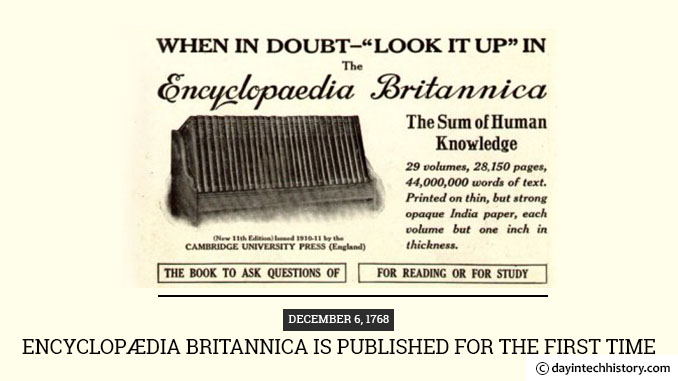The iconic Encyclopædia Britannica was the brainchild of the printer and bookseller Colin Macfarquhar and the engraver Andrew Bell. In 1778, the Scottish printer and his partner formed the “Society of Gentlemen” and hired the erudite William Smellie to come up with an encyclopedia that could be alphabetically aligned. The Encyclopædia Britannica made its debut in Edinburgh in Scotland. Volume I of the first edition was released on December 6, 1768. The initial volume was sold for a price of 6 to 8 pence depending on the quality of paper. By 1771, three-volume set was completed. In all some 3,000 copies of the first set were sold. The 2,391-page complete first edition was sold for a cost of about 12 pounds sterling. The original editions also included elaborate illustrations, a number of which were by Andrew Bell himself. Macfarquhar was inspired by the success of the 35 volume French Encyclopédie which consisted of 71,818 articles, and 3,129 illustrations. The French Encyclopédie later grew to contain 166 volumes written by 2,250 contributors including illustrious names such as Montesquieu, Rousseau, and Voltaire. Smellie and his colleagues focused on the utility of their encyclopedia, which grouped topics together in an alphabetical order. He made allowances for scholastic errors in favor of utility. Smellie said, “With regard to errors in general, whether falling under the denomination of mental, typographical or accidental, we are conscious of being able to point out a greater number than any critic whatever. Men who are acquainted with the innumerable difficulties of attending the execution of a work of such an extensive nature will make proper allowances. To these we appeal, and shall rest satisfied with the judgment they pronounce.” The earliest editions were hounded by a number of concerns, especially the question of plagiarism. Smellie seems to have borrowed liberally and literally from many famous writings, often without credit. With an increase in appeal and with contributions pouring in, this problem was eliminated. Starting with the Third Edition, the Encyclopædia Britannica started to enjoy immense popularity in both the US and the UK. This soon spread to almost all the nations that were part of the British Empire. The issue of piracy was a concern that regularly plagued the encyclopedia. A number of pirated versions became popular before the Britannica partnered for print in the US. The encyclopedia’s editorial team has often received criticism for the choice of topics included and also for the approach taken towards topics such as Hinduism. The Encyclopædia Britannica began to include contributions from many eminent personalities including scientists, writers, entertainers, and US Presidents. Some of the better known names include A C Swinburne, Albert Einstein, James G Frazer, Harry Houdini, Leon Trotsky, Marie Curie, Sigmund Freud, and Walter Scott. The final print edition of the encyclopedia featured about 65,000 articles written by 4,000 contributors, including the likes of Ian Rankin, Desmond Tutu and Bill Clinton After 244 years of publication, in 2012 Encyclopedia Britannica decided to stop production of its iconic multi-volume print edition encyclopedias. The announcement came on March 13, 2012 but according to the Britannica president Jorge Cauz the move was made in the best interests of the business since the print version represented only about 1% of the company’s sales. The company’s blog post announced that the 2010 edition 32-volume 129-pound set would be its last. Britannica’s decision to concentrate its attention on its digital encyclopedia and on coming up with numerous education tools such as mobile applications was part of its natural evolution, the company said. In 1981, Britannica came up with the first digital encyclopedia in the world. In 1989, it launched its first set of multimedia encyclopedia available on CD ROM. The first Internet version of Britannica went online in 1994. By the turn of the millennium, Encyclopædia Britannica had started to launch mobile applications. Another decade later, it partnered with Apple creating an app that would put the entire encyclopedia on Apple devices. Taking the print edition off the racks has saddened Britannica loyalists and book lovers around the globe and the final 12,000 set edition sold like hot cakes for an official price of $1,395 per set. Encyclopædia Britannica is now fully digital in an acknowledgement of technological evolution and to accord the encyclopedia a “bigger, more numerous, more vibrant” format. 6th December, 1956 – Nelson Mandela & 156 others arrested for political activities in South Africa. 6th December, 1424 – Don Alfonso V of Aragon grants Barcelona the right to exclude Jews. 6th December, 1534 – Quito, Ecuador, founded by Spanish. 6th December, 1897 – London becomes the world’s first city to host licenced taxicabs. 6th December, 1912 – China votes for universal human rights.
December 6 1768 – Encyclopædia Britannica is published for the first time
The iconic Encyclopædia Britannica was the brainchild of the printer and bookseller Colin Macfarquhar and the engraver Andrew Bell. In 1778, the Scottish printer and his partner formed the “Society…
367
